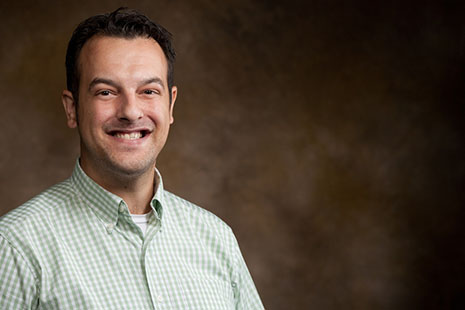Geologist Receives National Science Foundation Early Career Award
FAYETTEVILLE, Ark. – Gregory Dumond, an assistant professor of geosciences at the University of Arkansas, has received a $226,543 Faculty Early Career Development Program award from the National Science Foundation to further his research of major intracontinental strike-slip faults in Earth’s lower crust.
Dumond is analyzing the Canadian Shield, an area in northern Saskatchewan, Canada, that was formed by local strains and major intracontinental faults deep inside the planet. He hopes the work will answer questions about the formation of Tibet, a major plateau in Asia.
“We will study a field area in Canada that has crust and faults that were once very deep, as much as 50 kilometers, but are now exposed at the surface,” Dumond said. “This grant gives us an opportunity to study how these important faults work at depth. I am hoping to understand how the crust under Tibet works by using the field area in Canada as an analogy for the deep crust beneath it.”
The grant will support Dumond’s research over the next five years.
Dumond focuses on the relationship between continental collisions and deformations along Earth’s crust due to strike-slip faults, which occur where pieces of the crust slide past each other. These faults are important features for understanding how mountains and plateaus form. However, there is little research about what faults look like and how they work in the deeper parts of the crust.
The project will shed light on intensely debated topics of geosciences, such as continental collision, deformation along Earth’s crust and intracontinental strike-slip faults. Understanding deformation in the lower crust is critical for theories about whether constraint is equally distributed or confined to local areas across fault systems.
The grant directly benefits the university by enriching its newly established doctoral program in geosciences in the J. William Fulbright College of Arts and Sciences, Dumond said. Training and education will be provided for at least one doctoral student and several undergraduate students who will be integrally involved in research and outreach efforts.
These efforts will focus on education for teachers and students who live near the New Madrid seismic zone, an unexposed intracontinental fault that is the most seismically active region east of the Rocky Mountains.
Additionally, two professional development summer institutes will provide inquiry-based modules for teachers. When implemented and assessed, the teaching units will strengthen earth sciences curricula in Arkansas middle schools. In this effort, the researchers will collaborate with Lynne Hehr, the director of the University of Arkansas’ Center for Math and Science Education.
Dumond received a bachelor’s degree in geological sciences from University of Texas at El Paso, a master’s from Texas Tech University and a doctorate from the University of Massachusetts-Amherst. Following a two-year National Science Foundation postdoctoral fellowship at the Massachusetts Institute of Technology, Dumond joined the University of Arkansas in August 2010 as a tenure-track assistant professor in the geology division of geosciences.
Topics
Contacts
Gregory Dumond, assistant professor, geosciences
J. William Fulbright College of Arts and Sciences
479-575-3411,
gdumond@uark.edu
Liana Bugslag, intern
University Relations
479-575-5555,
lbugslag@uark.edu
Matt McGowan, science and research communications officer
University Relations
479-575-4246,
dmcgowa@uark.edu
Headlines
U of A Bands to Hold Three Nights of Concerts
The Symphonic Band, the Wind Symphony, the 4 O'Clock and 5 O'Clock Bands and the Wind Ensemble will perform April 21-23 at the Faulkner Performing Arts Center on the U of A campus.
Honors College to Host 'Best in Show' Dog Celebration
The campus and community are invited to celebrate our furry friends with popsicles, water and dog treats from 3-4 p.m. Thursday, April 25, in the Gearhart Courtyard.
New Parasite Affecting Canadian Partridges Named for Arkansas Poultry Scientist
A long-time colleague in Canada gave a newly found parasite the scientific name Eimeria hargisi in honor of U of A poultry science researcher Billy Hargis.
U of A School of Law Student Selected for Ms. J.D. Leadership Academy Intensive
Tristan Branstetter-Thomas, a second-year law student, was one of 30 students from across the country chosen to participate in the leadership academy at the Northwestern Pritzker School of Law in Chicago.
Needy Honored as Distinguished Alumna of University of Pittsburgh Engineering College
College of Engineering Dean Kim Needy was among seven alumni of the University of Pittsburgh Swanson School of Engineering honored in April as part of the 2024 Class of Distinguished Alumni.





